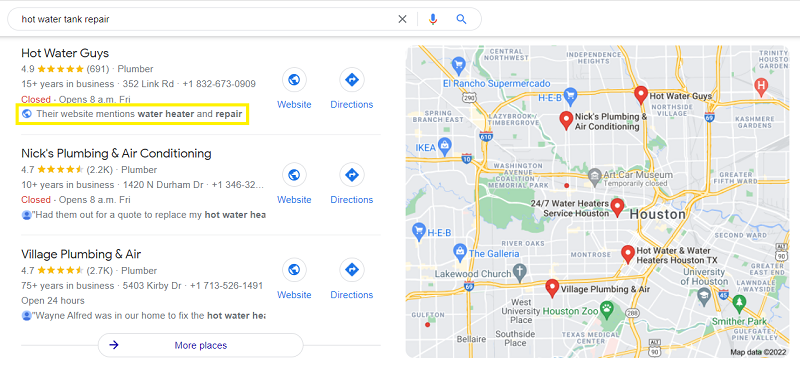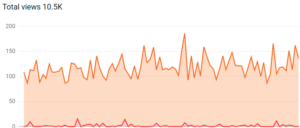Local businesses that have a well-optimized Google Business listing often dominate local search results compared to their less optimized competitors. Having a well-optimized Google Business listing is an easy way to bring in tons of views, website visits, phone calls, and leads.
I’ll show you how the basics of how to optimize your Google Business listing based on Google’s guide on improving your local rankings. Google’s guide is short but it shares everything you need to know about improving your local rankings. In this post, I’m going to expand on Google’s guide from an SEO perspective.
Google’s Local SEO Ranking Factors
In order to rank for local searches, you first need to know what the main ranking factors are for local SEO. Here are the most important local ranking factors that are mentioned by Google. These factors are:
- Search relevance: How relevant your business is to a user’s search.
- Proximity: How close your business is to the searcher.
- Prominence: How well-known your business is by people in your area.
- Website Authority: How established your website is compared to other websites.
In this guide, I’ll cover how to leverage these 4 ranking factors throughout your Google business listing and website.
1. Add complete and detailed listing information
Google’s first recommendation is to ensure that your listing is filled out thoroughly and accurately. This is pretty straightforward but often overlooked. Improving your listing information is the best way to improve your search results. Here are some tips on how to maximize your results:
Enter complete data
- Add every bit of information you can that is either relevant or useful.
- Your business’s categories should have the best fitting category as your primary, and other applicable categories as secondary categories.
- Add a detailed description of your business.
- Add your products and services to your listing and add descriptions to those as well.
Verify your location
- Make sure your location is verified by Google, your listing won’t show until you do!
- You can verify by postcard and sometimes by phone.
Keep hours accurate
- Use your actual business hours, users can update this if they aren’t accurate.
- Make sure you update your hours for holidays and special events too.
Manage and respond to reviews
- Provide real, thoughtful feedback on both good reviews and bad reviews.
- Ask happy customers for Google reviews, it’s a ranking factor!
Add Photos
- Add photos of your business, your team, the office, lounges, projects, and anything that showcases you are a real business.
- Adding a couple of new photos every month can also help you increase visibility.
2. Improve Your Relevance to Searches
Once you have your listing filled out with detailed information, the next step is to make it as relevant to searches as possible. To do this, all you need to do is figure out what keywords people search for when looking for your products and services. Once you know what keywords are going to be highly relevant, all you need to do is sprinkle those keywords into your listing.
Do some keyword research
Google wants you to add detailed information to your listing so their algorithm can figure out what search terms to show your listing for. If you know what search terms you want your listing to show for, you can add those as keywords in your listing and improve your search results. You can figure out what keywords you should add to your listing by doing some keyword research. There are lots of tools that can help you with keyword research, pick your favorite and get to researching.
Optimize your listing with keywords you want to rank for
Once you know what keywords you would like your business to show up for, all you need to do is strategically add them to your listing. You can add these keywords in your description, categories, products, services, and posts. Something I mention often is that it’s always better to use natural language than to stuff your content with keywords. Well-written content should always take precedence over well-optimized content. If you have well-written content that can touch on your keywords and be on-topic, you are good to go.
3. Optimize your Google Business listing for local searches
There are two types of searches that Google considers local. The first type is when the search includes the city or area you are in such as “digital marketing agency in Edmonton”. The second type is when the search doesn’t include the location in the search term. When the user doesn’t include a location in their search, Google will leverage the users’ location data to show customized local search results.
Knowing how to optimize for local searches will help you maximize your visibility in your city, which means more calls and leads for your business! Here are some tips:
- Include your city in your listing description.
- Include your city on your website’s page titles.
- Mention your city on your website’s landing page headlines and content.
- Use local business schema on your website.
- Get citations from websites that include your business name, address, and phone number (more on this below.)
4. Improving Your Prominence
What is prominence? In Google’s eyes, your prominence is how well-known your business is. This is one of the most important ranking factors for local SEO and it works similarly to your website’s authority. If a user searches for a local product or service and Google shows three listings that all had the exact same information, prominence will decide who gets to rank #1 for that search.
Google included prominence in their algorithms to help well-known businesses and landmarks in the area show up more prominently than others. However, Google doesn’t actually know how well-known a business is, it only has an idea based on a collection of signals. This means that if you can influence the signals Google uses to determine prominence, you can increase your local rankings.
Here’s how to improve your prominence:
1. Get directory citations
A directory is a website like Yellow Pages that lists your business. The information listed often contains your business name, address, and phone number. These are called citations (mentioned earlier). There are thousands of directories you can list your business on, often for free. Getting more citations will help you improve your prominence. You’ll want to get citations from big directory sites like Yellow Pages and Apple Maps, as well as local citations like your Chamber of Commerce and citations on industry-specific directory websites relevant to your business.
How many citations do you need? It depends on how many citations your competitors have. There is definitely a law of diminishing returns with citation building. A good rule of thumb is around 80 for each location.
2. Get more reviews and higher ratings
The number of reviews you have and your average rating score are factored into local search rankings. Getting more reviews and more positive ratings will improve your business’s local ranking. This means that striving to get great Google reviews from your customers will actually help you get more customers. There are some great tools out there that can help you get more reviews, like this Google review link generator.
3. Maintain consistent and updated information
A huge factor that is often not mentioned enough is having consistent information across the web. If you have listings on a directory with information that is no longer accurate, it is no longer helping you. Make sure your name, address, phone number, website, and other business information remain constant wherever you list your business online, including your social media profiles.
4. Have verified social media profiles
Having verified social media profiles is another little-known factor for ranking locally. Google knows whether your social media listings are verified, they even filed a patent that detects if your followers are fake. A real business is more likely to have real social media profiles. Google’s algorithms take your social media profile’s validity into consideration when determining your local prominence.
5. Improve Your Website’s SEO
SEO best practices on your website also help your local SEO rankings. Your website’s ranking in search results is a ranking factor for your local SEO results. This means that if your website ranks #1 for a search term, you’re much more likely to show up #1 in local maps results for that search in your area. There are three main areas to focus on when improving your website’s SEO:
1. Improve your website content
Optimizing your website’s content for searches that are highly relevant to your business will help you improve your rankings and visibility. If you optimize your content, you will get more traffic from people searching for your products and services, which will help you get more leads and customers. Optimizing your content involves some keyword research, planning, and strategic edits to your website’s content. You should also remove any duplicate content on your site, it will help Google find the right pages to show.
2. Work on your technical SEO
There are certain technical aspects of your website that Google takes into consideration when determining rankings. Improving your website’s technical SEO will help you improve your rankings. Your website’s loading speed, URL structure, indexing settings, and links within your website all contribute to your overall rankings because they help Google understand your website. Improving the technical aspects of your website can be difficult and usually requires an expert’s guidance.
3. Acquire more backlinks
The quality and quantity of websites that link to yours have been a major ranking factor since SEO began. If you can get great and relevant websites to link to your website, you will see major improvements in your rankings. You can get more links by making great content that people will link to, like a guide, tool, or infographic. You can also get more links by getting published on websites in your city like the local news or chamber of commerce. There are tons of ways to build links, check out this definitive guide to link building to learn all about getting more links.
6. Tracking Your Google Business Insights
Once you’ve optimized your business for local SEO, you are probably going to want to track your results. Google Business insights provide lots of useful information about how people find and interact with your listing. However, Google’s insights only provide three months of data. Personally, I like the SuperMetrics for data studio integration for reporting on historical Google Business performance.
Wrapping up
Improving your local search rankings is one of the best ways to get more highly relevant traffic which will help your business get more customers. SEO can be confusing and technical, but the benefits of having a well-optimized site and Google Business listing are definitely worth the trouble. For some more tips on optimizing your listing, check out this guide.



